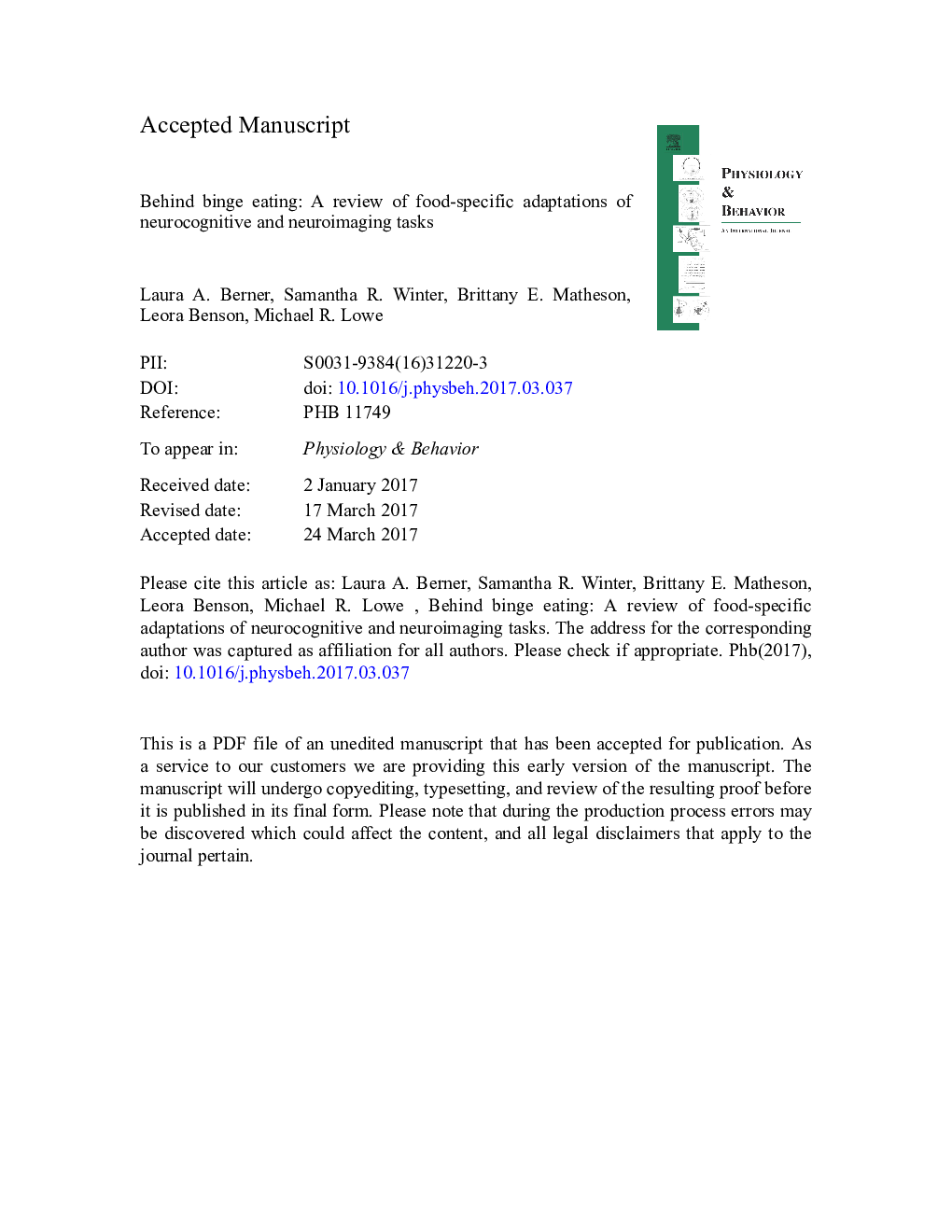| کد مقاله | کد نشریه | سال انتشار | مقاله انگلیسی | نسخه تمام متن |
|---|---|---|---|---|
| 5593884 | 1571143 | 2017 | 59 صفحه PDF | دانلود رایگان |
عنوان انگلیسی مقاله ISI
Behind binge eating: A review of food-specific adaptations of neurocognitive and neuroimaging tasks
ترجمه فارسی عنوان
پس از خوردن غذا: بررسی سازگاری های غذایی خاص از وظایف عصبی شناختی و عصب شناسی
دانلود مقاله + سفارش ترجمه
دانلود مقاله ISI انگلیسی
رایگان برای ایرانیان
کلمات کلیدی
ترجمه چکیده
نوشیدن مجدد، خوردن غذا یا پرخوری همراه با احساس از دست دادن کنترل، نگرانی عمده بهداشت عمومی است. شناسایی شباهت ها و تفاوت ها در میان افراد مبتلا به خوردن غذا و کسانی که با سایر علائم روانپزشکی و مشخص کردن نقص ها که به طور منحصر به فرد افراد را به خوردن مشکلات سوق می دهد، برای بهبود درمان ضروری است. تحقیقات نشان می دهد که پاداش تغییر یافته و فرآیندهای مرتبط با کنترل ممکن است به تغذیه نامنظم و سایر رفتارهای تحرک در جمعیت پرخوری کمک کنند، اما بهترین روش برای ارزیابی قابل اعتماد از مشارکت این فرآیند برای خوردن غذا، نامشخص است. در این بررسی، ما وظایف استاندارد عصب شناختی و عصبی را که میزان پاداش و فرآیندهای مربوط به کنترل را ارزیابی می کنند، خلاصه می کنیم، سازگاری های این وظایف مورد استفاده برای مطالعه خواندن و خواندن غذا و نقص در غذا را شرح می دهیم و مزایا و محدودیت های این وظایف را در نظر می گیریم. مطالعات آینده، ادغام هر دو وظایف عمومی و غذای خاص با تصویربرداری عصبی، درک فرآیندهای عصبی و مدارات عصبی که به خوردن غذا کمک می کنند و می توانند مداخلات جدیدی را که مستقیما به این رفتار فرآیند تشخیصی هدف می دهند یا جلوگیری می کنند، بهبود بخشند.
موضوعات مرتبط
علوم زیستی و بیوفناوری
بیوشیمی، ژنتیک و زیست شناسی مولکولی
فیزیولوژی
چکیده انگلیسی
Recurrent binge eating, or overeating accompanied by a sense of loss of control, is a major public health concern. Identifying similarities and differences among individuals with binge eating and those with other psychiatric symptoms and characterizing the deficits that uniquely predispose individuals to eating problems are essential to improving treatment. Research suggests that altered reward and control-related processes may contribute to dysregulated eating and other impulsive behaviors in binge-eating populations, but the best methods for reliably assessing the contributions of these processes to binge eating are unclear. In this review, we summarize standard neurocognitive and neuroimaging tasks that assess reward and control-related processes, describe adaptations of these tasks used to study eating and food-specific responsivity and deficits, and consider the advantages and limitations of these tasks. Future studies integrating both general and food-specific tasks with neuroimaging will improve understanding of the neurocognitive processes and neural circuits that contribute to binge eating and could inform novel interventions that more directly target or prevent this transdiagnostic behavior.
ناشر
Database: Elsevier - ScienceDirect (ساینس دایرکت)
Journal: Physiology & Behavior - Volume 176, 1 July 2017, Pages 59-70
Journal: Physiology & Behavior - Volume 176, 1 July 2017, Pages 59-70
نویسندگان
Laura A. Berner, Samantha R. Winter, Brittany E. Matheson, Leora Benson, Michael R. Lowe,
